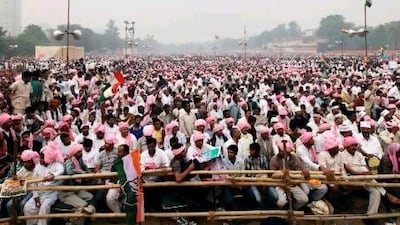NEW DELHI // The leaders of India's embattled ruling Congress party held a rare rally yesterday to shore up support ahead of next year's elections and to counter widespread criticism of its economic policies.
More than 100,000 people, including politicians and chief ministers from all the Congress-ruled states, gathered at Ramlila Maidan to support the party and its prime minister, Manmohan Singh, buffeted by falling economic growth, parliamentary deadlock that has scuppered his legislative plans and a series of corruption scandals.
The rally was led by Sonia Gandhi, the leader of Congress, who does not usually make public speeches. She defended a series of politically unpopular economic reforms launched by the government over the past few months, including the opening of India's retail sector to foreign investment and cutting fuel subsidies.
In her fiery speech, Mrs Gandhi also addressed corruption allegations levelled at her party.
"I admit corruption is a cancer; it is a disease," she said. "We will continue to fight this disease."
But, she said, referring to the opposition: "They are mired in corruption charges themselves. That is why they are making false allegations. They want to weaken the democratic edifice of this country, but they will not succeed.
"They lecture us on corruption but are corrupt themselves."
Many top government officials and Congress politicians are facing corruption charges.
These stem from scandals over the hosting of the 2010 Commonwealth Games, the sale of the mobile phone spectrum and allocation of coalfields that auditors said had lost the country billions of dollars.
The prime minister told the crowd that foreign investment, by superstores such as Walmart and Tesco, will build the infrastructure required to unblock supply bottlenecks and bring down prices, and boost the agricultural industry.
"Farmers will get the right price for their produce. New employment opportunities will emerge, especially for the youth," Mr Singh said.
Critics, including the leading opposition Bharatiya Janata Party (BJP), say foreign supermarkets will destroy millions of jobs in small shops and will lead to lower prices for farmers in the long term.
Mr Singh also defended the decision to raise fuel prices, including reducing subsidies on cooking gas and diesel, as a way to reduce the country's expenditures and its reliance on imported petroleum products, which has reached 80 per cent.
The rally was a show of strength, designed to make its case ahead of national elections, which will be held in 18 months.
As the rally took place, residents of the northern Himalayan state, Himachal Pradesh, were going to the polls in a state election. The results were expected to be carefully scrutinised for the impact of corruption allegations against the party.
Last week, Mr Singh reshuffled the cabinet, viewed as a sign that Congress is gearing up for major changes.
"This rally [serves] as a precursor to the reorganisation of the party's governing committee: the Congress is definitely moving into election mode," said Mihir Sharma, an economist and columnist for The Business Standard newspaper.
"The party is trying to recapture the narrative, which they have lost. Both the September reforms and the reshuffle put corruption allegations on the back-burner, however briefly, and they've learnt their lesson: they need to change the subject to the economy."
Mrs Gandhi's son, Rahul, also spoke, raising his profile before a possible bid to be prime minister.
Rahul, 42, whose father, grandmother and great-grandfather all led India, vowed to fight to modernise the country through reforms that he said would help the poor and provide jobs for the rapidly growing population.
"The Gandhis' aggressive speeches and their wholehearted backing of the prime minister is, I expect, supposed to indicate that Mrs Gandhi is not willing to give up just yet," said Mr Sharma.
Congress will probably face another raucous session of parliament when it reconvenes on November 22.
Congress, now a minority in parliament, will not only face tough questions from the BJP, but also from former allies who left the coalition over the decision to cut subsidies on fuel.
* With additional reporting from Agence France-Presse and Associated Press
Follow
The National
on
& Surya Bhattacharya on

